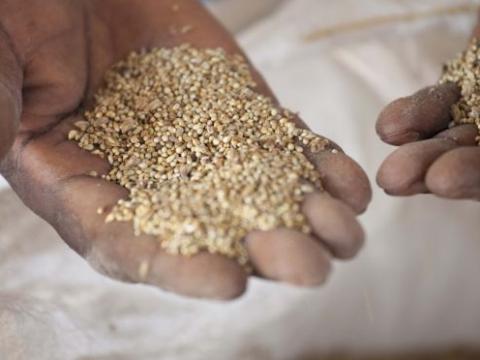World Vision at the FIARA

World Vision Senegal was at the 17th edition of the International Fair of Agriculture and Animal Resources (FIARA) held in Dakar from 29 March to 18 April. It was a good opportunity for the organization to showcase the outcomes of projects on resilience and livelihoods implemented in the zones where it works.
This edition of the international fair was organised around the theme of "the role and place of peasant organizations and family farms, in contributing towards the achievement of the ‘Emerging Senegal Plan’ (PSE)."
Through exhibitions and themed debates organized during various fairs, FIARA sought to strengthen and build capacity skills related to production, processing and marketing of family farms, recognising their potential to grow and evolve into viable small businesses that can actually deliver value and revenue to families in recognition of their potential to eventually evolve into small and medium rural enterprises that are economically viable and capable of creating the conditions for value addition.
Who attended ?
World Vision attended the fair with its local partners from Bambey, Mbirkelane, Kounkané, Velingara and Kolda. They displayed their combined efforts and impacts in the areas of economic development, agriculture, environmental management and food security.
World Vision Senegal and its partners designed these projects to:
- Support women to develop income-generating activities through the processing and production of local products.
- Train peasant leaders on Farmer-Managed Natural Regeneration (FMNR) techniques designed to restore the fertility and viability of farmland.
- Strengthen the capacity of communities to diversify income generating opportunities through climate-smart production strategies.
Furthermore, World Vision Senegal has been working with Community Based Organisations on developing and using better technologies with a view to optimising farm and natural resources through processing.
Agricultural development
A showcase of the value and impact of World Vision interventions in Senegal
Throughout the FIARA, World Vision Senegal was able to showcase achievements and impacts in economic development and food security projects:
From April 6 to 10 community projects from Kounkané, Mbirkelane and Fatick displayed a selection of products produced with solely local ingredients, such as honey, milk derivatives, processed local cereals and tie and dye products.
From 11 to 18 April, the Project SATISFY* (a food security project funded by the Canadian Government ) exhibited a wide variety of products such as “thiakry”, “couscous”, “atieke” and ginger/ hibiscus syrup, processed from its production units run by the communities.
Empowerment of beneficiaries
Panel Discussion on Farmer-Managed Natural Regeneration.
On Friday, April 8th, World Vision organized a panel, on the "Contribution of Peasant Leaders Associations towards the accomplishments of the Emerging Senegal Plan (PSE) through Farmer-Managed Natural Regeneration (FMNR)." The FMNR project was originally launched by World Vision Senegal in the regions of Kaffrine and Fatick, and the Fair panel was designed for participants to share experience and results.
In an effort to promote the benefits of FMRR, the Fair provided opportunities for model peasants who had succeeded well using FMNR techniques, to present the results of their efforts and work.
In an effort to promote the benefits of FMNR, the Fair provided opportunities for model peasants who had succeeded well using FMNR techniques, to present the results of their efforts and work.
What is Farmer-Managed Natural Regeneration?
Farmer -Managed Natural Regeneration (FMNR) is an agroforestry technique which consists of protecting and managing natural shoots and regrowth from tree stumps and shrubs in the fields.
It is both inexpensive and helps improve the environment and livelihood conditions of rural populations. In Senegal, comparative studies conducted by World Vision and the Senegalese Institute for Agricultural Researches (ISRA) to compare millet yields in fields with and without FMNR systems confirmed yields (in terms of ears of corn harvested) from fields with FMNR were greater than those from fields.
Support to producers
*SATISFY : Sytems approach to improve and sustain food security


